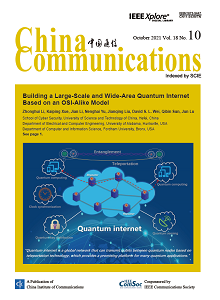Linear precoder design for correlated rician fading channel under imperfect CSI
IF 3.1
3区 计算机科学
Q2 TELECOMMUNICATIONS
引用次数: 0
Abstract
In this paper, we have modeled a linear precoder for indoor multiuser multiple input multiple output (MU-MIMO) system with imperfect channel state information (CSI) at transmitter. The Rician channel is presumed to be mutually coupled and spatially, temporarily correlated. The imperfection with CSI is primarily due to the channel estimation error at receiver and feedback delay amidst the receiver and transmitter in CSI transmission. Along with, the insufficient spacing between the antenna at transmitter and receiver persuades mutual coupling (MC) among the array elements. In addition, the MIMO channel is presumed to be jointly correlated (Weichselberger correlation model). When we look back on the existing precoder design, it considered spatial correlation alone disregarding joint correlation of antenna array elements. With all above assumption, we have designed a linear precoder which minimizes mean squared error (MSE) subjected to total transmit power constraint for MU-MIMO system. The simulation results proven that proposed precoder shows substantial enhancement in bit error rate (BER) performance in comparison with the existing technique. The mathematical analysis corroborates the simulation results.不完全CSI下相关衰落信道的线性预编码器设计
本文针对具有不完全信道状态信息(CSI)的室内多用户多输入多输出(MU-MIMO)系统,建立了一个线性预编码器模型。假定该通道是相互耦合的,在空间上是暂时相关的。CSI传输的缺陷主要是由于接收端信道估计误差和接收端和发送端反馈延迟造成的。同时,发射机天线与接收机天线之间的间距不够,导致了阵列单元之间的相互耦合。此外,假定MIMO信道是联合相关的(Weichselberger相关模型)。回顾现有的预编码器设计,一般只考虑空间相关,而忽略了天线阵元的联合相关。基于上述假设,我们设计了一种线性预编码器,使MU-MIMO系统在总发射功率约束下的均方误差(MSE)最小。仿真结果表明,与现有的预编码器相比,该预编码器在误码率(BER)性能上有显著提高。数学分析证实了仿真结果。
本文章由计算机程序翻译,如有差异,请以英文原文为准。
求助全文
约1分钟内获得全文
求助全文
来源期刊

China Communications
工程技术-电信学
CiteScore
8.00
自引率
12.20%
发文量
2868
审稿时长
8.6 months
期刊介绍:
China Communications (ISSN 1673-5447) is an English-language monthly journal cosponsored by the China Institute of Communications (CIC) and IEEE Communications Society (IEEE ComSoc). It is aimed at readers in industry, universities, research and development organizations, and government agencies in the field of Information and Communications Technologies (ICTs) worldwide.
The journal's main objective is to promote academic exchange in the ICTs sector and publish high-quality papers to contribute to the global ICTs industry. It provides instant access to the latest articles and papers, presenting leading-edge research achievements, tutorial overviews, and descriptions of significant practical applications of technology.
China Communications has been indexed in SCIE (Science Citation Index-Expanded) since January 2007. Additionally, all articles have been available in the IEEE Xplore digital library since January 2013.
 求助内容:
求助内容: 应助结果提醒方式:
应助结果提醒方式:


